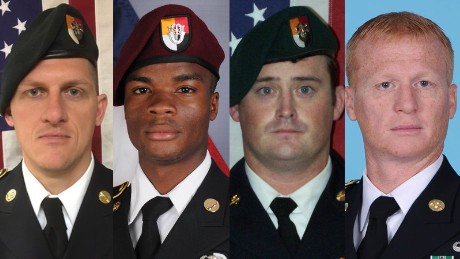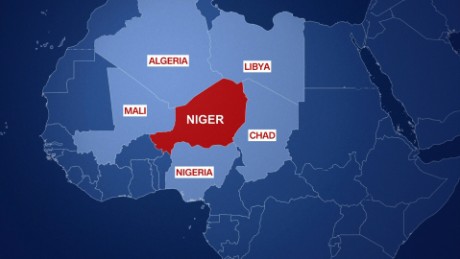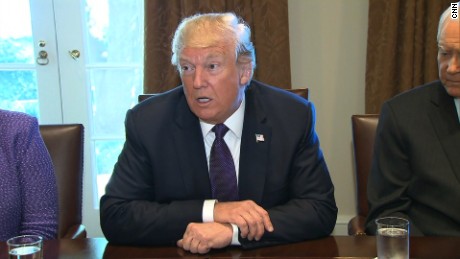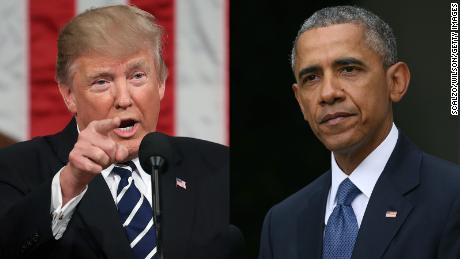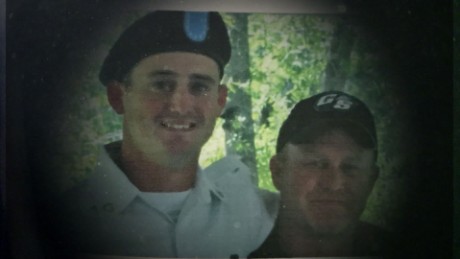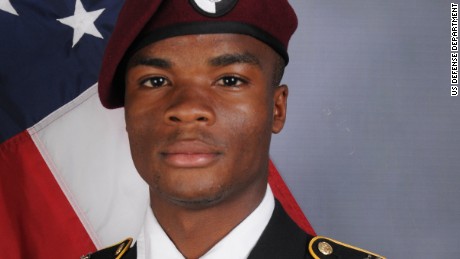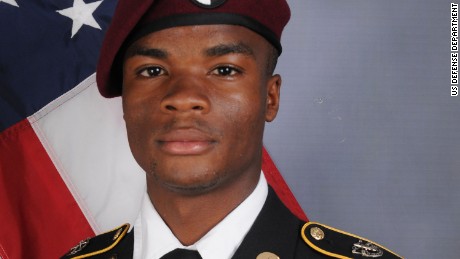(CNN)As a political firestorm grows over an ambush that left four US soldiers dead in Niger three weeks ago, the Department of Defense has begun to provide a more detailed account of what happened.
But even with the new timeline, it's still unclear how the mission in the West African nation went so wrong -- or why one of the fallen soldiers, Sgt. La David Johnson, was not recovered for two days. Five Nigerien troops were also killed in the firefight and two other US soldiers injured.
Joint Chiefs Chairman Gen. Joseph Dunford said information is limited, but pledged to share findings from an investigation with the soldiers' families and the public.
"We owe the families of the fallen more information, and that's what the investigation is designed to identify," Dunford said during a Pentagon briefing Monday.
The US Africa Command is trying to establish an hour-by-hour timeline of what happened as part of a comprehensive investigation.
Here's a chronology of what we know about the attack so far:
October 3
Twelve members of the US Special Operations Task Force accompanied 30 Nigerien forces on a mission to gather information. The group left from Niger's capital, Niamey, to travel to an area near the village of Tongo Tongo, Dunford said.
They were armed with machine guns and small arms, he said. "They did not expect resistance on this particular patrol, at least when they first planned it," Dunford said
October 4
Around mid-morning the US and Nigerien forces were moving south, back to their operating base, when about 50 attackers ambushed them.
The fighters, believed to be an ISIS-affiliated group, were armed with small-arms, rocket-propelled grenades and using "technical vehicles," according to Dunford.
About one hour into the firefight, the team requested support.
"But it's important to note that when they didn't ask for support for that first hour, my judgment would be that that unit thought they could handle the situation without additional support," Dunford said. "And so, what we'll find out in the investigation [is] exactly why it took an hour for them to call."
A remotely piloted aircraft arrived overhead within minutes of the request for help. It was tasked to provide surveillance and reconnaissance and to capture video over the scene, the general said. French Mirage jets arrived approximately one hour later -- two hours after the troops made initial contact with enemy forces.
Of the four US soldiers killed, one was separated from his 12-member team. Sgt. La David Johnson was not recovered with the others and initially was unaccounted for. Survivors of the ambush in initial after-action interviews felt the villagers were delaying their departure and may have been complicit in the ambush.
President Donald Trump, returning from his visit to Las Vegas in the aftermath of the shooting there earlier this month, was briefed on the attack by chief of staff John Kelly.
October 5
US Africa Command released a statement regarding the incident in Niger.
October 6
Even with the details still murky, the Pentagon identified the three soldiers killed: Staff Sgt. Bryan C. Black of Washington state, Staff Sgt. Jeremiah W. Johnson of Ohio, and Staff Sgt. Dustin M. Wright of Georgia. They did not identify Johnson, of Florida, who was unaccounted for.
That evening, his body was found nearly a mile away from the central scene of the ambush, four administration officials told CNN.
Dunford said he could not definitely confirm reports that Johnson was found nearly a mile away but that those details would come to light as part of the investigation. Nigerien forces found the body, he said.
The Pentagon is still looking at the exact circumstances of how and when Johnson became separated.
"From the time the firefight was initiated until Sgt. Johnson's body was recovered, French, Nigerian, or US forces remained in that area," he said.
October 7
Johnson's body was returned to Dover Air Force Base. The Pentagon identified Johnson as the fourth service member who died.
October 13
Despite repeated questions from CNN, White House officials declined to explain why Trump was not commenting on the deaths in Niger. Trump, meanwhile, had been golfing for several days.
October 17
The Defense Department announced that it was conducting an initial review of the mission in Niger. White House press secretary Sarah Sanders said Trump had called the families of the four soldiers.
Johnson's body returned home to Florida, where his widow, Myeshia Johnson, waited tearfully. She embraced the flag-draped casket and wept as one of her children stood next to her.
Florida Rep. Frederica Wilson told CNN affiliate WPLG that Trump told Johnson's widow that the soldier "knew what he signed up for ... but I guess it still hurt." She said the call came shortly before Johnson's casket arrived. Wilson was in the car, listening on speakerphone along with Johnson's mother.
The contents of the call touched off a controversy and sparked a feud between Trump and Wilson, a Florida Democrat.
The attack then became more than a military tragedy. It turned into a political controversy.

